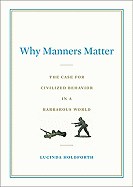

Invoking such distinguished allies as Aristotle, Edmund Burke and Orwell and ranging across a wide swath of Western history, Holdforth (whose name alone, it seems, makes her eminently suited to tackle the subject of this book), argues that manners are much more than the tricks that passed for proper behavior in what once was called "polite company." More crucially, in her view, they're essential social lubricants and shock absorbers that help cushion the inevitable friction that arises from the pursuit of each of our goals in increasingly complex human networks. "Manners are a civil mode of human interaction," she writes. "They matter because they represent an optimal means to preserve our own dignity and the dignity of others."
Holdforth's claims for the importance of manners are expansive but crisply and persuasively argued: They're an antidote to excessive self-absorption, a necessary adjunct to a legal system whose reach has become both more intrusive and less effective in defining proper conduct, a counterweight to fundamentalists of all creeds and simply a way of increasing our overall happiness. Dismissing works like Amy Vanderbilt's 1952 etiquette tome as "practically useless," she offers an eight-point "modern template for manners," with prescriptions as elegant and blunt as "Wait your turn" or "Watch what you are doing: multitasking is the enemy of manners" or "Most of the time, shut up." She even offers an intriguing paradigm of mannerly behavior: the Rotary Club.
On a planet inhabited by almost seven billion people, advancing toward nine billion in 2040, sources of conflict inevitably will increase. In this understated, elegant little book, Lucinda Holdforth reminds us that if we don't soon set about the task of treating each other more civilly, that world is likely to be one in which a fair number of us won't want to live.--Harvey Freedenberg
Shelf Talker: A witty and thoughtful look at the decline of civil behavior in modern society and some useful prescriptions for resurrecting it.

